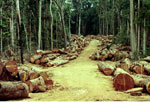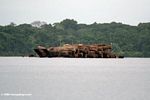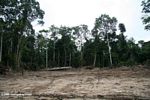FEATURED ARTICLES [Most recent articles]
Higher temperatures slow tropical tree growth
(04/23/2007) Climate change may be reducing growth rates of tropical rainforest trees, a development that could have widespread impacts for biodiversity, forest productivity, and even climate change itself, according to new research published in Ecology Letters. The results contradict the hypothesis that higher levels of carbon dioxide would boost growth rates of trees in the tropics.
[
Forests | Climate Change | Global Warming Mitigation]
Soybeans may worsen drought in the Amazon rainforest
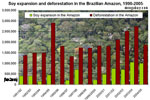
|
|
(04/18/2007) The rapid expansion of soybean cultivation in the Amazon may be having a larger impact on climate than previously believed, according to research published last week in Geophysical Research Letters. Using experimental plots in the Amazon, a team of scientists led by Marcos Costa from the Federal University of Viçosa in Brazil found that clearing for soybeans increases the reflectivity or albedo of land, reducing rainfall by as much as four times relative to clearing for pasture land.
[
Agriculture | Amazon | Brazil | Soy]
Frogs avoid damaging UV-B radiation, reducing extinction risk
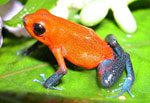
|
|
(04/18/2007) Poison arrow frogs appear to make special effort to avoid exposure to damaging ultraviolet-B radiation, according to research published in the journal Biotropica. The findings are significant in light of increasing levels of UV-B radiation due to ozone depletion. UV-B radiation has been shown to increase the incidence of developmental abnormalities and may make frogs more susceptible to disease. It is believed to be one of several factors contributing to the rapid global decline in amphibians since 1980.
[
Amphibians]
Neon green gecko key to preventing Mauritian plant extinction

|
|
(04/17/2007) A vibrantly colored gecko plays a key role in a highly threatened ecological community in Mauritius, reports new research published in American Naturalist. Studying plant-animal interactions in Mauritius, an Indian Ocean island famous for its extinct dodo bird, researchers found that a rare plant, Trochetia blackburniana, benefits from its proximity to Pandanus plants because they house high densities of geckos responsible for pollination. The findings, which unusually identify a lizard as a key pollinator, are significant because they provide "valuable management insights for ongoing conservation efforts to save the highly endangered flora of Mauritius."
[
Animal Behavior | Biodiversity]
Bad news for frogs; amphibian decline worse than feared

|
|
(04/16/2007) Chilling new evidence suggests amphibians may be in worse shape than previously thought due to climate change. Further, the findings indicate that the 70 percent decline in amphibians over the past 35 years may have been exceeded by a sharp fall in reptile populations, even in otherwise pristine Costa Rican habitats. Ominously, the new research warns that protected areas strategies for biodiversity conservation will not be enough to stave off extinction. Frogs and their relatives are in big trouble.
[
Conservation | Amphibians | Extinction]
An interview with IT conservation expert Ken Banks:
Cell phones, text-messaging revolutionalize conservation approaches
(04/15/2007) Cell phones have been adopted at a pace unmatched by any technology in the history of mankind. While conventional use of these devices continues to expand, mobile phones are also increasingly being viewed as tools for conservation and development. Ken Banks, currently a Visiting Fellow on the Reuters Digital Vision Program at Stanford University, understands this well. Banks established kiwanja.net as hub for the latest information on how technology, in particular mobile phones, can be applied to tackle issues of economic empowerment, conservation, education, human rights and poverty alleviation.
[
Conservation | Interviews| Technology]
Palm oil and the environment

|
|
(04/04/2007) Palm oil is deservedly getting a lot of negative press for widespread deforestation that reduces biodiversity, degrades important ecological services, worsens climate change, and traps workers in inequitable conditions sometimes analogous to slavery. This doesn't have to be the case. Oil palm can be cultivated in a manner that helps mitigate climate change, preserves biodiversity, and brings economic opportunities to desperately poor rural populations. Mongabay.com explores oil palm cultivation in a series of three articles:
[
Palm Oil | Biofuels | Indonesia | Sustainable Development]
Deadly cyclones hurt conservation efforts in Madagascar
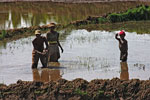
|
|
(04/03/2007) As Madagascar braces for the arrival of the sixth major cyclone (Gaya) to hit the Indian Ocean island this season, researchers from a prominent conservation have asked for help in the relief and recovery effort. Local officials with the Bronx Zoo-based Wildlife Conservation Society say that the series of storms have left tens of thousands of people homeless, devastated croplands, and diverted already short funds from conservation activities.
[
Madagascar | Conservation]
Congo forest elephants declining from logging roads, illegal ivory
(04/02/2007) Fast-expanding logging roads in the Congo basin are becoming "highways of death" for the fierce but elusive forest elephant, according to a new study published in the journal Public Library of Science. Logging roads both provide access to remote forest areas for ivory poachers and serve as conduits of advancing human settlement.
[
Congo | Logging | Elephants]
Climate change may decimate Indonesia's food supplies, worsen fires
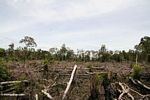
|
|
(04/30/2007) Climate change could worsen food shortages in Indonesia by delaying the onset of monsoon rains reports a new study published in Proceedings of the National Academy of Sciences (PNAS). The findings suggest that the country could face increasing risk of drought and forest fire if nothing is done to control rising greenhouse gas emissions.
[
Indonesia | Climate Change]
Arctic sea ice melting faster than previously thought
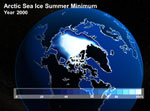
|
|
(04/30/2007) Arctic sea ice is melting far faster than previously believed reports a new study published in the May 1 issue of Geophysical Research Letters. A comparison of newly available observational data to advanced simulations reveals that Arctic sea ice has been disappearing about three times faster than the average rate of loss projected by computer models. The new research, conducted by Julienne Stroeve of the National Snow and Ice Data Center (NSIDC) and his colleagues, shows that September sea ice extent retreated at a rate of about 7.8 percent per decade during the 1953-2006 period, not the 2.5 percent projected by simulations.
[
Sea Ice | Greenland-Arctic]
U.S. and China fight plan to slow global warming
(04/30/2007) Claiming that costs of fighting global warming will be higher than consensus estimates, China and the United States are fighting plans to slow climate change, according to the Associated Press (AP). The countries also say the impacts of climate change will not be as severe as projected and want to raise the emissions cap of atmospheric carbon dioxide levels from 430 parts per million (ppm) proposed by the European Union to 445 ppm. Current CO2 levels stand around 381 ppm.
[
Climate Change | Environmental Politics]
Chrysler to launch a hybrid SUV
(04/30/2007) Chrysler will launch hybrid versions of the Dodge Durango and Chrysler Aspen SUVs according to a report from CNNMoney.com. It will be the automaker's first hybrid engine car.
[
Automobiles]
Madagascar adds 15 protected areas
(04/30/2007) Madagascar has added 15 new protected areas covering nearly 1 million hectares (2.4 million acres) of land, reports Conservation International (CI). The move will help protect the island's unique wildlife from extinction.
[
Madagascar | Happy-Upbeat Environmental]
Cleantech investment booms, but energy tech bubble looms
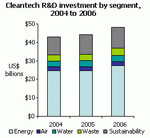
|
|
(04/30/2007) Investors are pouring money into clean technology, with spending on R&D rising to $48 billion in 2006, up 9 percent from 2005, reports a new study by Lux Research, an emerging technology research and advisory firm. However, the report warns that the energy technology sector is showing signs of a bubble, with initial public offering (IPO) values and venture capital deployments more than doubling last year.
[
Energy | Economics]
Dutch plan restricts biofuels that damage environment
(04/29/2007) The Netherlands has proposed a system to reduce the environmental impact of biofuels production. The country becomes the first in the world to establish such guidelines.
[
Palm Oil | Biofuels]
Scotts Miracle-Gro is evil [external]
(04/28/2007) Scotts Miracle-Gro Company has sued TerraCycle, Inc., an inner-city company founded by college students to create an eco-friendly business. Scotts claims the two companies' products look similar and will confuse consumers, a bizarre claim when one compares the labels. (thanks to Grist.org)
[
Sued by Scotts]
Ecuador: pay us not to develop Amazon oil reserves
(04/27/2007) Ecuador says it will wait a year to see whether the international community takes its offer to forsake development of a giant oil field in the Amazon rainforest in exchange for compensation, reports the Environmental News Service.
[
Ecuador | Oil]
Poor governments will be asked to pay $175 for $100 laptop
(04/27/2007) The governments of Uruguay, Argentina, Brazil, Pakistan, Thailand, Nigeria and Libya will be asked to pay about $175 for each OLPC laptop, a computer targeted for children in developing countries. The device was originally estimated to cost $100.
[
OLPC | Technology]
Dutch will demand rainforest-friendly palm oil
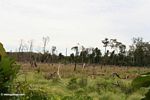
|
|
(04/27/2007) In a report scheduled to be released today, the Dutch government will outline criteria for growing biofuels in a more sustainable manner. The guidelines will be closely watched by the rest of Europe, which is currently struggling with the environmental pros and cons of large-scale energy crop production, especially in ecologically-sensitive areas like the Amazon and Indonesian rainforests.
[
Palm Oil | Biofuels]
Japan will kill 50 humpback whales
(04/26/2007) Humpback whale populations are rebounding but concerns are rising over Japan's plans to kill 50 humpback whales for "scientific" research, reports a paper published in the latest issue of Science. In the "News Focus" section of Science, Virginia Morell writes that Japan will kill 50 humpback whales, 50 fin whales, and more than 900 fin whales in the International Whaling Commission's (IWC) Southern Ocean Whale Sanctuary each year. Japan claims that it will use the harvest to "help explain ecosystem dynamics in the Southern Ocean," though other scientists question their motives.
[
Whales | Oceans]
China uses "green construction" for Tibet railway
(04/26/2007) To the surprise of many observers, China went to great lengths to minimize the environmental impact of its new Qinghai-Tibet Railway, the highest railway in the world. Still, despite these efforts, there will likely be detrimental environmental effects from its construction, writes a team of researchers in the latest issue of the journal Science.
[
China]
Volcanoes linked to massive global warming event

|
|
(04/26/2007) Scientists have linked a sharp spike in ocean temperatures 55 million years ago to massive volcanic eruptions that created the North Atlantic Ocean when Greenland and northwestern Europe separated. Writing in the current issue of the journal Science, geologists at Roskilde University in Denmark, Oregon State University and Rutgers, argue that intense volcanic activity occurred at the same time ocean temperatures jumped five to six degrees Celsius during the Paleocene-Eocene thermal maximum.
[
Climate Change | Earth Science]
Brazil splits environmental agency to fast-track development projects
(04/25/2007) Brazil will divide its environmental protection agency IBAMA into two separate entities reports Reuters. The move is expected to speed development projects in the Amazon rainforest.
[
Brazil | Amazon]
China to push for sustainable logging overseas
(04/25/2007) In a surprising move, China has developed guidelines for the establishment of sustainable forest plantations abroad by Chinese firms, according to the International Tropical Timber Organization's (ITTO) April 1 Tropical Timber Market Report. The move comes as China faces increasing criticism from environmental groups for pillaging the world's forests to feed its rapidly growing economy.
[
China | Happy-Upbeat Environmental]
China to spend $2.1B to protect wetlands

|
|
(04/25/2007) China says it will spend more than $2.1 billion (16.5 billion yuan) to protect and restore its highly endangered wetlands over the next five years. Addressing a recent forum on the Yangtze River last week, Zhu Lieke, deputy head of the State Forestry Administration, said that China's lakes and wetlands are suffering from pollution, soil erosion, water shortages, and development.
[
China | Happy-Upbeat Pollution]
Indonesia urges rich countries to ban illegally logged wood products
(04/25/2007) Indonesia has urged rich countries not to buy products made from illegally logged timber, echoing a similar call from Malaysia last month, according to the International Tropical Timber Organization's (ITTO) April 1 Tropical Timber Market Report.
[
Indonesia | Logging]
New railway will facilitate logging in Congo
(04/25/2007) A new 800-km railway backed by a South Korean consortium will boost logging in the Republic of Congo, reports the International Tropical Timber Organization (ITTO) in its April 1 Tropical Timber Market Report. The South Korean group has agreed to build the railway from Brazzaville to Ouesso in exchange for timber concessions in Republic of Congo's remote, but densely forested northern region.
[
Africa | Congo]
Illegal logging in Malaysia due to gangsters
(04/25/2007) The Malaysian government has blamed "gangsters" for illegal logging syndicates in the country. Malaysia's deforestation rate has leapt by 86 percent since the close of the 1990s, according to data from the U.N. [
Illegal Logging | Malaysia]
To fight warming, Canada will ban incandescent light bulbs by 2012
(04/25/2007) In an effort to fight greenhouse gas emissions, Canada plans to ban use of incandescent light bulbs by 2012, said Natural Resources Minister Gary Lunn. Canada follows Australia as the second country to announce a ban on the inefficient bulbs. California legislators have proposed a similar ban for 2012.
[
Energy | Energy Efficiency]
Scientists capture video of rare Borneo rhino

|
|
(04/24/2007) WWF has captured video footage of the rare Borneo rhino. Video from a camera trap shows the animal eating, walking to the camera and sniffing the equipment. It is first time the beast's behavior in the wild has been captured on film. There are only 25-50 of the rhino left in the wild on the island.
[
Borneo | Endangered Species]
McDonald's, Greenpeace Unite To Prevent Rainforest Clearing [External]
(04/24/2007) The Washington Post featured an article on an unlikely partnership between McDonald's and Greenpeace that forced Cargill and other agricultural giants to establish a moratorium on the purchase of soy from newly deforested areas. Soybeans are playing an increasingly important role in Amazon deforestation.
[
Washington Post]
AES Corp seeks to flood rainforest World Heritage site
(04/23/2007) American power company AES Corporation seeks to flood sections of Panama's La Amistad World Heritage site, alleges a coalition of more than 30 environmental groups that today filed a petition against the electric utility.
[
Panama]
Deepwater fish growing slower due to global warming
(04/23/2007) Changes in ocean temperature have altered the growth rates of commercially harvested fish over the past century, according to a new study published in this week's early online edition of the Proceedings of the National Academy of Sciences (PNAS).
[
Fish | Climate Change]
World's first rainforest found in Illinois
(04/23/2007) Earth's first rainforest has been found in an Illinois coalmine, according to research published in Geology. The 300 million year fossilized forest consists of a mix of extinct plants including a 130-foot high (40 meter) canopy of club mosses, a sub-canopy of tree ferns, and tree-sized horsetails.
[
Rainforests]
Biodiesel may worsen global warming relative to petroleum diesel

|
|
(04/23/2007) Biodiesel made from rapeseed could increase rather than reduce greenhouse emissions compared to conventional diesel fuels, reports a new study published in the journal Chemistry & Industry. Overall the researchers found that petroleum diesel and rapeseed biodiesel, presently the main biofuel used across Europe, have a similar environmental impact. The results suggest that efforts to mitigate climate change through the adoption of rapeseed biodiesel may be of little use beyond energy security.
[
Biofuels | Bioenergy | Energy]
Rarest leopardess brutally killed in Russia
(04/23/2007) WWF reports that a female Far Eastern leopard (Panthera pardus orientalis) was found brutally killed in Russia. The Far Eastern or Amur leopard is the world's rarest cat with a wild population numbering 25-34 individuals.
[
Endangered Species | Wildlife | Hunting]
Two minor additions to the site
(04/22/2007)
I've added a comment blog/guestbook and pages showing the most popular news articles for a given month. There will be some more significant features coming online over the next month or two.
[
Environment]
Mongabay for kids launches in 39 languages
(04/21/2007) The rainforest site for kids is now available in 39 languages, 17 of which are officially ready and 22 of which are in "beta":
arabic,
brazilian portuguese,
bulgarian (beta),
chinese (simplified),
chinese (traditional) (beta),
croatian (beta),
czech (beta),
danish,
dutch (beta),
english,
farsi,
finnish (beta),
french,
german (beta),
greek (beta),
hindi,
hungarian (beta),
icelandic (beta),
indonesian,
italian,
japanese (beta),
korean,
latin (beta),
malay,
marathi,
norwegian (beta),
polish (beta),
portuguese (beta),
romanian (beta),
russian,
serbian (beta),
slovenian (beta),
spanish,
swahili,
swedish
tagalog (beta),
turkish (beta),
vietnamese (beta),
welsh (beta).
[
Kids]
Please excuse site weirdness
(04/21/2007)
Mongabay.com has been moved to a new set of servers. As such you may encounter some minor performance and character display issues over the next few days as computers synch, etc. Thanks for your patience.
[
Environment]
Thoughts on Earth Day (2005)
(04/21/2007)
Back in 2005 I wrote these thoughts regarding Earth Day.
[
Environment]
Rare mountain gorillas in Uganda on the increase
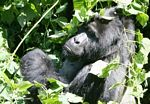
|
|
(04/20/2007) Highly endangered mountain gorillas in Uganda are increasing, reports a new census by the Uganda Wildlife Authority, the Wildlife Conservation Society, the Max Planck Institute of Anthropology and other groups. The population of gorillas in Bwindi Impenetrable National Park has increased from 320 in 2002 to 340 today. A 1997 study found 300 gorillas, indicating that the park population has increased by 20 percent over the past decade. Aggressive conservation measures have been the key say researchers.
[
Wildlife | Gorillas | Happy-Upbeat Environmental]
Global warming, not mass suicide, threatens lemmings

|
|
(04/20/2007) Lemmings, the rodents inaccurately believed to commit mass suicide by jumping off cliffs, are at real risk from climate change, reports the Wildlife Conservation Society (WCS). The Bronx Zoo-based group has just announced plans to study the impact of global warming on these creatures of the far North.
[
Wildlife | Climate Change]
New bird species discovered in the South Pacific
(04/19/2007)
University of Florida scientists have discovered a new genus of frogmouth bird in the Solomon Islands. The findings are published in the April edition of Ibis: The International Journal of Avian Science.
[
Birds | Species Discovery]
How to stop haze and forest fires in Indonesia
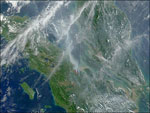
|
|
(04/19/2007) In recent years, annual forest fires in Indonesian have destroyed millions of hectares of forest and caused billions of dollars in economic damage. After each episode of fires the Indonesian government, facing criticism from neighboring governments, promises it will crack down. Nothing happens and the fires burn again the next year. According to experts--including Dr. Lisa Curran, a biologist who has spent more than 20 years in Borneo--the cycle appears to be worsening. 2006 saw the highest loss of forest cover ever recorded in Indonesia even though climate conditions in a La Nina year were such that fires should have been below average.
[
Indonesia | Fires | Haze]
Less than 35 Amur leopard remain in the wild
(04/19/2007) A new census shows the world's most endangered cat, the Amur or Far Eastern leopard (Panthera pardus orientalis), is on the brink of extinction with a wild population estimated at 25-34 individuals.
[
Endangered Species | Biodiversity]
Luxury designers are clueless when it comes to green fashion
(04/19/2007) While cutting-edge designers use eco-friendly fabrics made from the likes of bamboo and hemp to craft comfortable and stylish clothes that have a reduced impact on the planet, "green" fashion has been slow to take off at the luxury level, reports an article in today's Wall Street Journal.
[
Green Design]
Damage to Yangtze "irreversible" says China

|
|
(04/17/2007) Pollution, dams and excessive boat traffic have caused an "largely irreversible" decline in the aquatic ecology of the Yangtze says a report issued by China's official State Environmental Protection Administration (SEPA). The report reveals that the more than 600 kilometers of the river are in "critical condition" and nearly 30 percent of its major tributaries, including the Minjiang, Tuojiang, Xiangjiang, and Huangpu rivers, are "seriously polluted." It further indicates that the river's annual harvest of aquatic products dropped by about 77 percent between the 1950s and the 1990s, from 427,000 tons to roughly 100,000 tons.
[
China]
First amphibians were biters not suckers

|
|
(04/16/2007) Prehistoric aquatic amphibians developed the ability to feed on land well before they became terrestrial reports a new study in the early online edition of Proceedings of the National Academy of Sciences (PNAS). The research, conducted by Harvard University biologists Molly J. Markey and Charles R. Marshall, is based on analysis of 375-million-year-old skulls of the first amphibians and their fish ancestors. The researchers say the "shapes of the junctions between adjacent skull bones" reveal how these extinct animals captured prey.
[
Fossils]
Palo Alto aims to cut CO2 emissions 80% by 2050
(04/15/2007) The city of Palo Alto, California aims to cut greenhouse gas emissions significantly in coming years, joining a growing number of U.S. cities that have pledged to cut emissions by 80 percent by 2050. The goal, set forth in "Green Ribbon" task force report last year, was discussed by a panel of experts convening at Stanford University Sunday.
[
California | Energy | United States]
As Amazon falls, Brazil sets record in timber plantations
(04/12/2007) Brazil planted a record area of forest plantations in 2006 even as more than 13,000 square kilometers of natural forest in the Amazon were lost. According to the International Tropical Timber Organization (ITTO), a survey by the Brazilian Forest Service and the Secretariat of Biodiversity and Forests of the Ministry of Environment found that Brazilian firms planted 627,000 hectares of industrial forest plantations in 2006, an increase of 13% from 2005.
[
Amazon | Brazil]
Measures to drive adoption of super efficient cars in the U.S.
(04/12/2007) To reduce its growing dependence on foreign oil the United States could implement relatively low-cost measures to put millions of super efficient vehicles on American highways, said energy efficiency expert Amory Lovins of the Rocky Mountain Institute in a speech at Stanford University. The measures could significantly cut oil usage, help fight climate change, and make U.S. roads safer.
[
Energy | Fossil Fuels | United States]
Illegal logging threatens Congo's forests, global climate
(04/11/2007) Despite government and World Bank assurances to the contrary. a new report from Greenpeace finds that illegal logging is rampant in the Democratic Republic of Congo (DRC). The report, Carving up the Congo, reveals that in spite of a 2002 moratorium on new logging, over 15 million hectares of rainforest have been concessioned to loggers with little regard to the environmental impact or compensation to affected communities.
[
Congo]
ConocoPhillips becomes first U.S. oil major to call for CO2 limits
(04/11/2007) This week ConocoPhillips became the first major U.S. oil firm to call for a legally-binding emissions cap. The Houston-based company said it would join the U.S. Climate Action Partnership (USCAP), a coalition of corporations seeking to influence future climate policy.
[
Energy | Fossil Fuels | Climate Change]
Tsunami-producing quake caused mass coral death in Indonesia
(04/11/2007) Scientists from the Wildlife Conservation Society have reported what is thought to be one of the world's greatest mass death of corals ever recorded as a result of the earthquake in Aceh, Indonesia on 28 March 2005.
[
Coral Reefs | Earthquakes]
Tear-sucking moth in Madagascar feeds on bird eyes
(04/11/2007) Biologists have documented the first known case of moths feeding on the tears of birds. The research, published in the January 4 2007 issue of the journal Biology Letters, reports that the Hemiceratoides hieroglyphica moth "attacks sleeping birds in Madagascar" using its sharply barbed proboscis to penetrate the bird's eye. While similar behavior has been reported in mammals, this is the first known case of tear-feeding on birds.
[
Animal Behavior | Madagascar]
Climate change will worsen drought, hunger in Africa
(04/10/2007) Africa will suffer the brunt of climate change reports the latest installment of the Intergovernmental Panel on Climate Change (IPCC). The IPCC says that the projected increases in greenhouse gas emissions will put up to 1.8 billion more Africans at risk of water stress this century. Modest rises in temperature will reduce water availability in parts of the continent.
[
Africa | Climate Change]
TXU hopes to build nuclear reactors instead of coal-fired power plants
(04/10/2007) Texas energy company TXU will abandon plans to build coal-fired power planets and will instead focus on building the largest nuclear power plants in the United States according to an article from The Wall Street Journal.
[
Energy | United States]
Could global deforestation fight climate change?
(04/09/2007) While many climate change mitigation schemes rely on reforestation schemes to sequester carbon dioxide from the atmosphere, those located in temperate regions may actually be warming the planet, worsening global change, reports a new study published in the April 9-13 online edition of the Proceedings of the National Academy of Sciences. Surprisingly, the research suggests that global-scale deforestation would produce a net cooling effect, but that forest preservation efforts and reforestation in the tropics is more effective in cooling the planet.
[
Deforestation | Forests | Climate Change]
Indonesia and Australia sign deforestation pact

|
|
(04/09/2007) Indonesia and Australia have agreed to reduce deforestation in southeast Asia according to Malcolm Turnbull, the Australian Minister for the Environment and Water Resources. Turnbull was in Jakarta meeting with the Indonesian Minister for Forestry, M. S. Kaban, and the Minister for the Environment, Rachmat Witoelar.
[
Deforestation | Indonesia | Carbon Finance]
Man swims entire length of Amazon river

|
|
(04/09/2007) Slovenian marathon swimmer Martin Strel became the first person to swim the entire length of the Amazon River Saturday when he arrived in Belem, Brazil. Strel was immediately taken to the hospital in critical condition but is now recovering in a local hotel. Strel, 52, swam 5,265 kilometers (3,272 miles) in 66 days. Over the course of the swim Strel battled delirium, exhaustion, and infected sores on his legs. He also conquered fears of attacks by crocodiles, piranha, and bull sharks.
[
Amazon | Strange]
Congo cancels logging contracts, calls for sustainable forest management
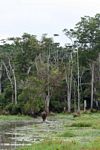
|
|
(04/09/2007) The new government of the Democratic Republic of Congo (DRC) cancelled more than 20 illegally-granted logging contracts which covered nearly three million hectares (7.4 million acres) of forest, according to a report from AFP. The announcement came at the International conference on the sustainable management of the forests in the DRC (ConForDRC) held February 26-27 in Brussels. At the conference policymakers agreed that Congo should maintain its moratorium on new logging and provide legal recognition for the rights of indigenous forest dwellers. There was wide support for Congo's participation in the Coalition of Rainforest Nations' proposal to seek compensation for forest conservation.
[
Congo | Logging]
Indonesia seeks to increase deforestation rate, already world's highest

|
|
(04/09/2007) Already having the highest deforestation rate in the world, Indonesia's Minister of Forestry announced the country would increase its harvest quota for natural timber for 2007 by 12 percent to 9.1 million cubic meters according to the International Tropical Timber Organization (ITTO). ITTO said the target quota may actually be 12.4 million cubic meters (53 percent higher than 2006) for the year. Logging, combined with large-scale clearing for oil palm plantations and other forms of agriculture, caused the loss of around 3 million hectares (30,000 square kilometers) of forest in Indonesia for 2006, giving the country the world's highest deforestation rate, well ahead of Brazil. Between 1990 and 2005 Indonesia lost more than 28 million hectares of forest, including 21.7 million hectares of virgin forest according to U.N. figures.
[
Deforestation | Indonesia | Logging]
Rainforest site for kids now in Danish, Hindi, Marathi, Swedish
(04/06/2007) The beta version of the rainforest information site for students and teachers is now available in Danish (thanks to Mette Engelbrecht), Hindi (A Pillai), Marathi (A Pillai), and Swedish (Helena Tsiparis). I still need help with German, Greek, Japanese, Norwegian, and Vietnamese.
[
Foreign languages]
Climate report warns of drought, rising sea levels, species extinction
(04/06/2007) Mainstream media reporting on the latest climate change impact update by the U.N. Intergovernmental Panel on Climate Change (IPCC) has been exceptionally poor to date--this might be due to the last-minute nature of the report. Continuing this trend--and in light of climate change news fatigue--I am simply posting an abridged version of the "Summary for Policymakers". The full summary is available in PDF form here. The new report is a essentially review of hundreds of recent scientific papers.
[
Climate Change]
Herring fish restored to Bronx River in New York City
(04/06/2007) Building on last year's first-ever successful stocking of river herring in the Bronx River, an estimated 400 additional fish were released today in an ongoing effort to establish a breeding population of these native fish in one of the nation's most urbanized waterways. The release, which took place on the grounds of the Bronx Zoo, is part of a partnership among a diverse group of officials, biologists and citizen's groups to restore the Bronx River, the only remaining fresh water river within New York City's borders.
[
Conservation | United States]
Climate change could turn Southwest into 'Dustbowl'
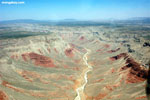
|
|
(04/05/2007) Global warming threatens to create a dustbowl in the American Southwest according to a new study published in the journal Science. The researchers predict that the drier climate will be "unlike any climate states that exist on record for the area" -- a forecast that does not bode well for one of the fastest growing population centers in the United States.
[
Climate Change]
Arctic sea ice extent second lowest on record
(04/03/2007) Winter sea ice in the Arctic was the second smallest area on record, narrowly missing the 2006 mark, according to scientists from the University of Colorado's National Sea and Ice Data Center (NSIDC).
[
Arctic-Greenland | Climate Change]
World's rarest rabbit captured on film in Sumatra
(04/04/2007) Scientists from the Wildlife Conservation Society working in the rainforests of Sumatra have captured the world's rarest rabbit on film using remote camera traps.
[
Indonesia | Biodiversity]
Nuclear power plants are financially risky given high costs
(04/04/2007) Nuclear power plants are risky investments given rapidly rising costs of construction of nuclear fuel, reports a new study by researchers from Georgetown University, Stanford University and UC Berkeley.
[
Energy | United States]
Cane toads to invade 2 million square kilometers of Australia
(04/04/2007) Cane toads are dramatically expanding their range in Australia and may eventually double their current extent to occupy over 2 million square kilometers, according to new projections by a team of scientists writing in Proceedings of The Royal Society B: Biological Sciences. The researchers report that the invasive amphibians increasingly occupying zones outside their native conditions, putting native Australian species at ever greater risk.
[
Australia | Invasive Species]
Chernobyl birds prefer to breed in sites with low radioactivity
(04/03/2007) Birds appear to prefer breeding sites with lower levels of radiation, according to research conducted in the immediate vicinity of the Chernobyl nuclear disaster in Ukraine. The study, published in the current edition of Proceedings of the Royal Society B: Biological Sciences, may be the first to look at the effects of radiation on animal breeding behavior in the aftermath of Chernobyl.
[
Birds | Pollution]
Protected areas must be adapted to survive global warming
(04/03/2007) Protected areas can play an important role in reducing biodiversity loss due to global warming, reports a new study published March 30 in the journal Frontiers in Environment and Ecology (FREE). The research says that conservation efforts must factor in shifts in species' ranges to be successful.
[
Extinction and climate change | Conservation]
Wildlife conservation plan moves forward in southern Sudan

|
|
(04/03/2007) A leading conservation group announced that it has signed two agreements with the Government of Southern Sudan (GoSS) to launch a conservation strategy for the region's wildlife. The New York-based Wildlife Conservation Society says that southern Sudan may have some of the richest wildlife in Africa.
[
Africa | Sudan | Happy-Upbeat Environmental]
2007 hurricane season will be 'very active' but not due to global warming
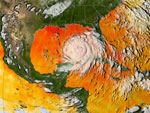
|
|
(04/03/2007) Developing La Nina conditions, not global warming, should make the 2007 Atlantic hurricane season 'very active' according to a top U.S. hurricane forecaster. William Gray of the Department of Atmospheric Science at Colorado State University said he expects 17 named storms this year, including 9 hurricanes. He says there is a 74 percent chance that a category 3, 4, or 5 hurricane will hit the U.S. coastline (the historic average for the past century is 52 percent) and a 49 percent chance that such a storm would hit the Gulf Coast of the United States (versus an average of 30 percent for the past century).
[
Hurricanes]
Antarctic insects make natural anti-freeze to survive cold
(04/02/2007) Insects in the some of the world's coldest places produce natural anti-freeze that enables them to survive sub-freezing temperatures for months on end according to research represented at the Society for Experimental Biology's Annual Meeting in Glasgow.
[
Insects | Strange]
Global warming could hurt salmon fisheries in Pacific Northwest

|
|
(04/02/2007) Global warming could cause Chinook salmon populations in Washington state to decline 20-40 percent by 2050 according to a new study published in the online early edition of the Proceedings of the National Academy of Sciences (PNAS). The researchers urge policymakers to focus on restoration of lower elevation habitats in order to reduce the expected impact of climate change on salmon populations.
[
Climate Change | Fish]
Supreme Court rebukes Bush Administration on global warming
(04/02/2007) The U.S. Supreme Court ruled against the Bush Administration in a landmark case with global warming implications. In Massachusetts v. EPA, the Supreme Court ruled 5-4 that (1) state governments and environmental groups have the right to sue the EPA, and (2) the EPA has the right to regulate CO2 emissions as a pollutant under the Clean Air Act. On a third point, where the EPA can choose not to regulate CO2 emissions, the Supreme Court directed the agency to "reconsider its refusal based on the factors set forth in the law."
[
Fossil Fuels | Politics]
The news of extinction: western media's response to the demise of the Baiji
(04/02/2007) In this guest editorial, Jeremy Leon Hance writes about his disappointment with the media's response to the apparent extinction of the Yangtze River Dolphin: The news came and went with an alacrity that I found alarming, almost jolting. I waited for weeks, faithfully; I could not believe that the initial announcement would be followed by nothing but silence on the issue, no rationalizations, no opinions, no discussions, no outpourings of grief. Just silence.
[
Extinction | China]
Illegally logged timber in Burma ends up in U.S. by way of China [external]
(04/01/2007) The Washington Post featured an excellent article on illegal timber harvesting in Burma by Chinese loggers. The wood is then shipped to coastal cities where it is processed into products sold in the United States. Few American consumers have any idea that they are buying wood illegally harvested from increasingly rare natural forests. The practice has been well-documented in the past by conservation groups, but the Washington Post brings the issue to widespread public attention.








